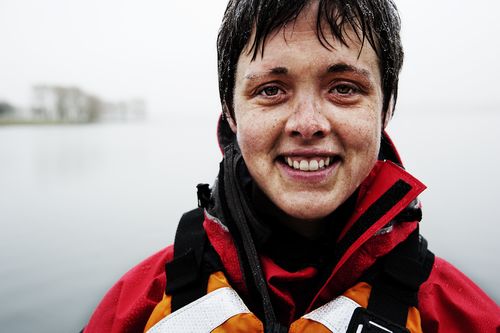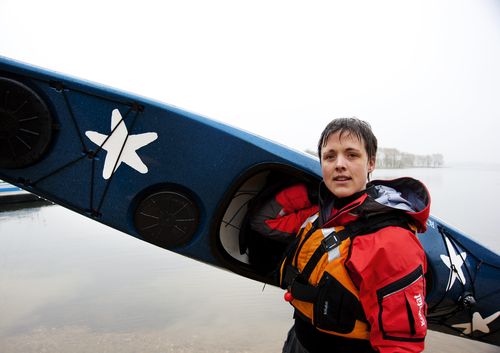
Two years ago today, 25-year-old English adventurer set out to row the Indian Ocean solo, becoming the first and only woman to do so when she finished in August 2009. Today, she's upping the ante by setting off on a two-and-a-half-year, 20,000-mile human-powered journey from London back to London via fourteen countries of the world. She starts by kayaking down the Thames from the Tower Bridge in London and across the English Channel to France. Then she'll jump on a bike, cycle across Europe and Asia to far-eastern Russian, kayak to Japan, and load up the rowboat for a four- to seven-month trip across the Pacific to Vancouver. Once she crosses the U.S. and Canada on bike, she'll row the Atlantic, then kayak back up the Thames to London. I caught up with Sarah before she kicks off to talk ocean rowing, going solo, and conquering the world one stroke at a time.
–Nick Davidson��
How was it rowing across the Indian Ocean?
It was the biggest journey I ever made in my life. It took me one failed attempt and four months at sea. It was huge and every bit the challenge you'd expect it to be. It had all the drama and excitement of a massive expedition, too–all the highs, lows, and scary and sometimes monotonous bits and wonderful moments of being at one with the world. It's brilliant.��
How did you decide on the Indian Ocean?
I first heard about the idea of ocean rowing in late 2005. I was a student at the time and had initially planned to go into the army on a scholarship. Then I damaged my knee playing hockey. So all those plans for the army had been wiped away, and I didn't have a plan. Ocean rowing completely captured my imagination, and I thought, one day I'm going to do this. The Atlantic is the most widely rowed ocean, but I wanted to be different. And the Pacific Ocean is obviously massive. The Indian is really the forgotten ocean in all respects, so I decided that would be my ocean. No woman had ever attempted it.��
What appeal does ocean rowing hold for you?
I was a rower at university and just thought the idea of rowing across an ocean was an amazing adventure. I was drawn to the simplicity of it, that energy and drama of the ocean and doing something really massively challenging. I love human-powered journeys. I love rowing, and I love the ocean, so I thought I'd put it all together, and it's going to be fun. Quite naive, brave thinking, perhaps, but it was a great��way to do it.
Why solo?
I'd first thought about rowing across an ocean with a team. Partway through making progress with that, my father died very suddenly in 2006. So it was that moment that changed my thinking, and I decided I wanted to do this big expedition for Dad, in his memory. It was so personal and unique to me that I didn't think other people could be on that boat with me. At crazy times in your life, you just need something crazy to get you through it.��
In doing that, I discovered that I love solo expeditions. I love the challenge of it and the perspective it gives you. I like the way that you're made to think, and just that you're allowed to think. When you're by yourself you're more aware of what's going on around you. I found that it was beautiful and that the next step up would be the world.
And now you are taking on the world.
Yes, it's exciting and a little bit scary, but I think that's a good way to be. I'd be worried if it wasn't. The adrenaline keeps it real.
How will you get your equipment where you need it for each stage of the expedition?
The logistics are massive. I've got a logistics manager who coordinates getting the boats from one place to another and provisioning the boats in Japan, so I don't have to worry so much about that. when I'm on the bike, I'm self-supported for the most part, buying food as I go. I've got a tent. On the kayaking legs, I'll have a support kayaker-camerawoman, Justine Curgenven. She'll be paddling with me and filming as well. Out on the ocean, it's simply me and the boat. Everything has to go on board to start with. You've got the food, the kit, a desalination unit to make water. The whole thing is as self-supported as possible.

��What goals do you have after this journey?
After this, I think I'm going to swim to the moon. I don't know. I've got three things that really excite me in life, and ultimately I'd like to be fusing those three–adventure, environment and wildlife, and young people. If I can merge that into something that was great fun and challenging for me but also derives benefit for others, then that's what I'd like to do.
I love teaching. I've been giving talks and workshops, and most of that has been with young people. I've gotten such a buzz out of it. I don't know what will happen afterward. I'm a great believer that opportunities come your way, and when you're working hard and spreading good energy, it gets returned to you as well.
Does it get lonely going solo?
Out on the ocean, I didn't ever feel lonely until the very end when I crash landed on the coral reef in Mauritius. I was very happy in my own company. I got a bit bored from time to time, perhaps, when the music cant play and you've got to sing to yourself. I have a really limited repertoire of songs in my head. I was happy to talk to the boat, talk to the birds, to the crew of fish that followed me across the ocean. So I hope that's the same for this way round as well. Sometimes you might like a hug, but you're not going to be on an expedition forever.
How do you pass the time rowing across an ocean?
I've got a Kindle, so I'm stacking that up with books. If there's enough juice in the solar panels, you can listen to music, which is good fun. I think the great think about expeditions is that it's really a chance to just be sometimes. You can relax into it and be so focused on the task at hand. It's such a simple lifestyle that you've got the wonderful opportunity to be at one with yourself and nature. It sounds quite spiritual, and I think it is in a way.��
At other times, you're just focused on staying alive. Sometimes you're concentrating hard on the next stroke, or on the bike you're concentrating on not getting squashed by something. Sometimes you're happy to wander in your thoughts. Other times it's a battle–you vs. the bike, or you vs. the road–and you've got to do whatever you can to make yourself move forward.
What did you miss the most on your last journey?
The biggest thing was fresh fruit and vegetables. I missed my dog. I didn't miss people so much because I could get email and maybe speak to them every so often. But I've chosen what I'm doing. Nobody forced me out on a massive expedition. So I don't think I do miss things. I've realized that you don't need a lot to be happy and to survive. But maybe after two and a half years I'll be hankering for something.��
Photos courtesy of Nigel Millard.��
��